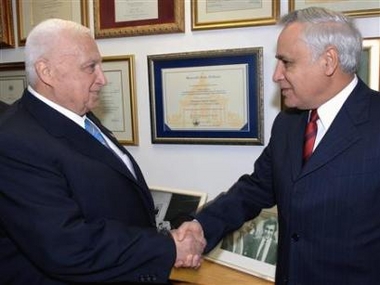|
Israeli PM Sharon quits Likud to pursue peacemaking
(AP)
Updated: 2005-11-22 08:39 Sharon set dramatic events in motion late Sunday with his decision to leave
the party he co-founded more than 30 years ago with dreams of hanging onto the
West Bank, Gaza Strip and east Jerusalem — lands captured in the 1967 Mideast
war and claimed by the Palestinians for a state.
His decision to pull Israel out of Gaza touched off a bitter rebellion by
former Likud allies. They failed to block the pullout, which enjoyed widespread
support in Israel, but seeking revenge for Sharon's perceived treachery,
continued going head-to-head with him in parliament.
On Monday, Sharon went to President Moshe Katsav to ask him to dissolve
parliament, the Knesset, and move up elections to early March from their
scheduled November date.
Katsav has yet to declare whether he would disband the legislature or let
parliament dissolve itself — an option some lawmakers favor because that could
buy them more time to campaign. While awaiting his decision, the Knesset voted
Monday to disband, but needs to vote three more times to clear the way for early
elections.
Sharon's push for March elections enjoys the support of Labor Party leader
Amir Peretz, who heads Israel's second-largest faction in the Knesset.
Although Sharon has thrown off the constraints of Likud, peacemaking in the
short term will be put on hold by Israel's elections and Jan. 25 balloting for
the Palestinian parliament.

Israeli Prime Minister Ariel Sharon (L) shakes
hands with Israeli President Moshe Katsav (R) during their meeting at the
President's residence in Jerusalem November 21, 2005.
[Reuters] | Efforts to jump-start peace moves
after those votes could run into trouble if Hamas militants make a strong
showing in the Palestinian balloting. Sharon has said he would not negotiate
with a Palestinian government that includes Hamas.
Sharon's departure from Likud sets the stage for a turbulent election
campaign, pitting him against a hawkish rump Likud and Peretz, a charismatic
union leader who has rejuvenated the Labor Party with an appeal to previously
alienated Jews of Middle Eastern ancestry.
Centrist political parties historically don't fare well in politically
polarized Israel, and some said Sharon was taking a big gamble.
"He's always been a risk-taker," said Shmuel Sandler, a political studies
professor at Bar-Ilan University. "He would have won the election (in a walk) if
he had stayed in Likud, but he didn't stay because he felt they were going to
put chains on him."
Still, Sandler said, neither Labor nor Likud would be able to attract enough
support to cobble together a government. Sharon "will be the only one who can
form a coalition," he said.
Labor, at Peretz's prodding, voted Sunday to pull out of Sharon's government,
which it joined last year to ensure the Gaza pullout. Labor's withdrawal forced
Sharon to make his decision now instead of closer to the originally scheduled
November elections.
Peretz, a political dove who wants to increase social spending, has said he
would consider teaming up with Sharon again under the right coalition lineup.
There was speculation that Labor veteran Shimon Peres would join with Sharon,
but Peres didn't spell out his plans Monday.
Sharon wasn't considered likely to seek a coalition with Likud.
"Otherwise he would have stayed in the Likud Party and agreed to the
opposition of the so-called rebels," said Avraham Brichta, a political science
professor at the University of Haifa.
Likud's acting Likud chairman, Tzahi Hanegbi, said the party would elect a
new leader quickly. The top contender is former Prime Minister Benjamin
Netanyahu, who opposed the Gaza pullout.
|